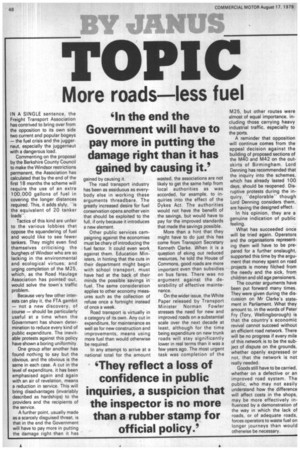TO PI
Page 50

If you've noticed an error in this article please click here to report it so we can fix it.
More roads less fuel
'In the end the Government will have to pay more in putting the damage right than it has gained by causing it.'
IN A SINGLE sentence, the Freight Transport Association has contrived to bring over from the opposition to its own side two current and popular bogeys — the fuel crisis and the juggernaut, especially the juggernaut with a dangerous load.
Commenting on the proposal by the Berkshire County Council to make the Windsor restrictions permanent, the Association has calculated that by the end of the first 18 months the scheme will require the use of an extra 100,000 gallons of fuel in covering the longer distances required. This, it adds slyly, "is the equivalent of 20 tanker Tactics of this kind are unfair to the various lobbies that oppose the squandering of fuel and would like to see fewer tankers. They might even find themselves criticising the burghers of Windsor who are so lacking in the environmental and ecological virtues; and urging completion of the M25, which, as the Road Haulage Association has pointed out, would solve the town's traffic problem.
Because very few other interests can play it, the FTA gambit — not a new discovery, of course — should be particularly useful at a time when the Government has shown determination to reduce every kind of public expenditure. The inevitable protests against this policy have shown a boring uniformity.
One group after another has found nothing to say but the obvious, and the obvious is the same in each case. A cut in the level of expenditure, it has been emphasised again and again with an air of revelation, means a reduction in service. This will bring disadvantages (invariably described as hardships) to the providers and the recipients of the service.
A further point, usually made as a scarcely disguised threat, is that in the end the Government will have to pay more in putting the damage right than it has gained by causing it.
The road transport industry has been as assiduous as everybody else in working these arguments threadbare. The greatly increased desire for fuel conservation opens another vein that should be exploited to the full, if only because it introduces a new element.
Other public services campaigning against the economies must be chary of introducing the fuel factor. it could even work against them. Education Ministers, in hinting that the cuts in their department might begin with school transport, must have had at the back of their minds the possible savings in fuel. The same consideration applies to other economy measures such as the collection of refuse once a fortnight instead of once a week.
Road transport is virtually in a category of its own. Any cut in expenditure, for maintenance as well as for new construction and improvements, means using more fuel than would otherwise be required.
In any attempt to arrive at a national total for the amount wasted, the associations are not likely to get the same help from local authorities as was accorded, for example, to inquiries into the effect of the Dykes Act. The authorities would not have the benefit of the savings, but would have to pay for the improved standards that made the savings possible.
More than a hint that they might have to do just this has come from Transport Secretary Kenneth Clarke. When it is a question of eking out reduced resources, he told the House of Commons, good roads are more important even than subsidies on bus fares. There was no argument against the desirability of effective maintenance.
On the wider issue, the White Paper released by Transport Minister Norman Fowler stresses the need for new and improved roads on a substantial scale over the next decade at least, although for the time being expenditure on new trunk roads will stay significantly lower in real terms than it was a few years ago. The most urgent task was completion of the M25, but other routes were almost of equal importance, including those carrying heavy industrial traffic, especially to the ports.
A reminder that opposition will continue comes from the appeal decision against the building of proposed sections of the M40 and M42 on the outskirts of Birmingham. Lord Denning has recommended that the inquiry into the schemes, which has already lasted 100 days, should be reopened. Disruptive protests during the inquiry, "deplorable– though Lord Denning considers them, are having the designed effect.
In his opinion, they are a genuine indication of public feeling.
What has succeeded once will be tried again. Operators and the organisations representing them will have to be prepared for a further onslaught, supported this time by the argument that money spent on road projects is money filched from the needy and the sick, from children and old age pensioners.
The counter arguments have been put forward many times. They were given during the discussion on Mr Clarke's statement in Parliament. What they amount to, in the words of Peter Fry (Tory, Wellingborough) is that the country's economic revival cannot succeed without an efficient road network. There will be no progress if every mile of this network is to be the subject of dispute on the grounds, whether openly expressed or not, that the network is not really needed.
Goods still have to be carried, whether on a defective or an improved road system. The public, who may not easily understand how the difference will affect costs in the shops, may be more effectively influenced by a demonstration of the way in which the lack of roads, or of adequate roads, forces operators to waste fuel on longer journeys than would otherwise be necessary.








































































































